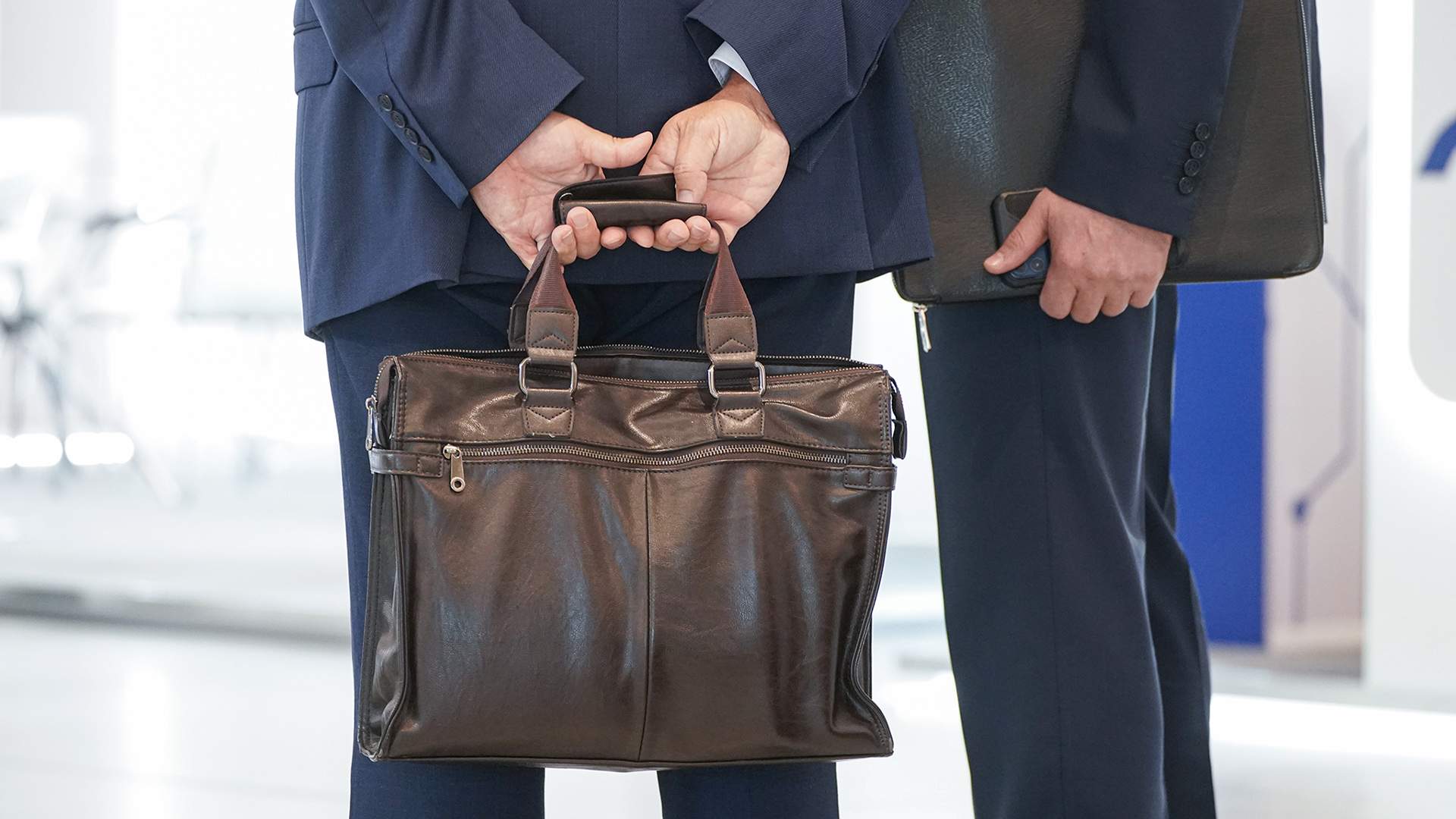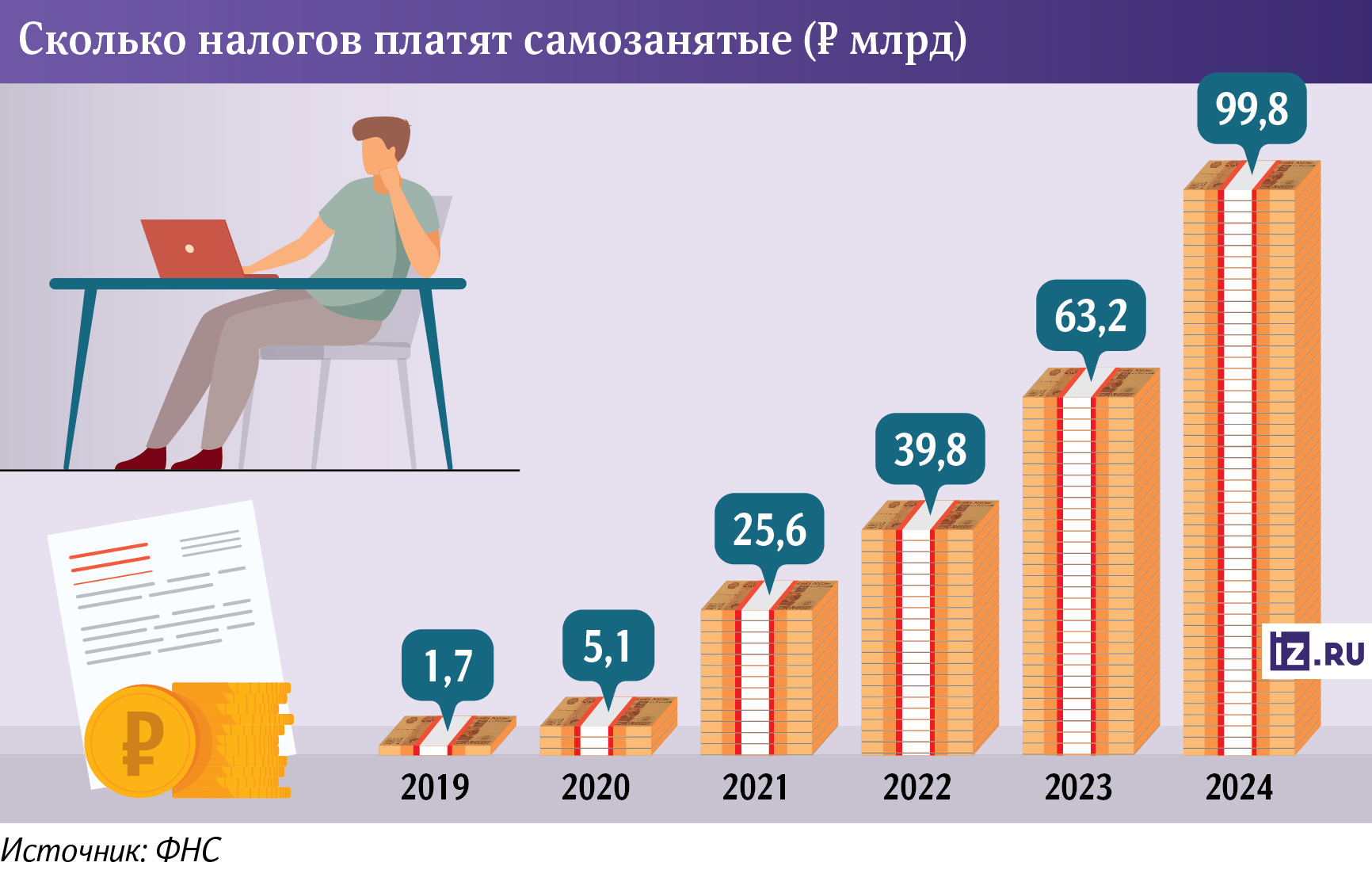Freelance literacy: the self-employed paid 100 billion in taxes in 2024

Last year, the self-employed paid 100 billion roubles in taxes. This is one and a half times more than the year before, Izvestia calculated on the basis of data from the Federal Tax Service. The reasons are the increase in the number of freelancers themselves, in the growth of their revenue and average check, which in turn is connected with inflation. In addition, more and more companies are transferring employees to self-employment in order to save on fees. However, for the citizens themselves, as well as for the state, it is unprofitable, because individuals remain socially unprotected, and the budget system receives less income. How the growth of self-employment affects the economy and what will happen to this regime after the end of the experiment - in the material of "Izvestia".
How much taxes do the self-employed pay
Last year, Russians paid 99.8 billion rubles in tax on professional income. This is 1.6 times more than a year earlier, when the self-employed paid 63.2 billion, Izvestia calculated on the basis of data from the Federal Tax Service. The editorial board sent an inquiry to the service.
Russia has a special regime for the self-employed - tax on professional income (PIT). It was introduced in 2019 as an experiment for 10 years - until 2028. Individuals and individual entrepreneurs (IE) who have switched to the NAP, pay the levy at a preferential rate - 4% (on income from individuals) and 6% (on income from legal entities and IE). There are no other mandatory payments. Most of the proceeds from the NAP (63%) are credited to the regional budget, the remaining 37% - to the health insurance fund.
The amount transferred by the self-employed is already quite significant on the budget scale. It is comparable to the revenues from privatization last year - 130 billion. In addition, this amount of revenue is commensurate with the federal budget expenditures in 2024 for the national projects on housing and communal services (123 billion) and the environment (78 billion), said Anna Tikhonova, associate professor at the Financial University under the Government of the Russian Federation.
- The growth of revenues under the NAP in 2024 is due to several factors - an increase in the number of the self-employed, a significant increase in their revenue and an increase in the "average check" on their income, which, for example, in Moscow has increased by 12% compared to 2023, to 3.3 thousand rubles, - explained the Director of Strategy at Finam IK Yaroslav Kabakov.
According to the Federal Tax Service, at the end of 2024, there were 12.2 million self-employed people, a year ago there were 3 million less. Most of the self-employed are concentrated in the repair, auto, IT and beauty industries.
The increase in the amount of taxes paid is comparable to the growth of revenue of the self-employed. Thus, according to the Federal Tax Service, these citizens earned Br2.2 trillion in 2024, which is 1.6 times more than in 2023 (1.4 trillion).
Why the self-employed pay more taxes
There are several reasons why the self-employed have started paying more taxes. First, the growing popularity of the NAP regime itself, which in addition to low rates of taxation implies the right to preferential lending, preferential lease of state property and access to electronic trading platforms, recalled Anna Tikhonova from the Finance University.
Secondly, the increase in revenues is due to the growth of inflation, due to which the size of the average check has increased - for their services simply began to pay more, continued the expert. Thirdly, technical business opportunities for the self-employed are expanding - more and more appear a variety of platforms through which you can both conduct transactions and administer the tax.
- Finally, there is a negative source of growth in the popularity of NAP - "preparation" of companies for the transition to progressive personal income tax. Now the cap on insurance premiums is indexed annually, and in addition a five-stage income tax scale is introduced, so unscrupulous taxpayers can "transfer" their employees to self-employment in advance to partially cover tax losses, - shared Anna Tikhonova.
At the same time, in conditions of staff shortage many companies have project vacancies with specific tasks that can be transferred to outsourcing, added Yulia Kovalenko, Associate Professor at Plekhanov Russian Economic University.
But there is a significant disadvantage of this regime - the lack of mandatory insurance premiums, continued Yulia Kovalenko. Because of this, the self-employed do not form a pension, if they do not deduct for old age. In addition, in case of illness, they are not assigned sick leave, if they do not voluntarily transfer money to the Social Fund. As a result, he under-receives funds, and citizens remain socially unprotected, the expert summarized.
From 2026, the self-employed will have the right to sick leave. According to the draft law of the Ministry of Labor, NAP payers will be able to voluntarily insure themselves in case of temporary disability, but then will have to make their own contributions to the Social Fund. The monthly rate of deductions will amount to 3.84% depending on the chosen insurance amount (Br35 thousand or Br50 thousand), i.e. Br1.3 thousand or Br1.9 thousand, respectively.
Changes in the self-employment regime
The growing number of freelancers changes the structure of the labor market. On the one hand, it promotes entrepreneurship, which provides additional employment and economic growth, said Anna Tikhonova from the Finance University. She added: on the other hand, the tendency to transfer full-time employees into self-employment without their actual "independence" leads to unjustified budget losses, tax evasion schemes and the growth of social insecurity of a whole layer of citizens.
In addition, in the future, with the expansion of the layer of self-employed, the lack of social guarantees may become a global problem not only for individuals themselves, but also for the state, the expert continued. According to her, the legislation allows only voluntary insurance for NAP payers, while only 3% of freelancers make such deductions. Therefore, in the future it is necessary to ensure certain mandatory contributions to the Social Fund for this group of citizens, said Yulia Kovalenko from Plekhanov Russian Economic University.
In the future, the self-employed should also simplify access to public procurement, creating conditions for them to participate in tenders, says Yaroslav Kabakov from Finam.

It is likely that after 2028, those who work for themselves will increase tax rates, believes Stepan Zemtsov, Director of the Center for Economic Geography and Regionalistics of the Presidential Academy. However, according to the expert, this decision should be left to the regions.
Переведено сервисом «Яндекс Переводчик»








